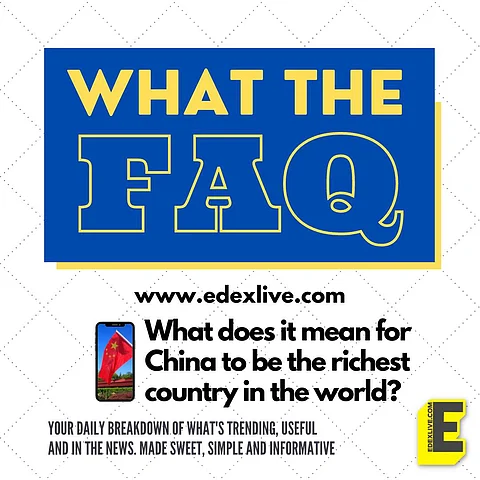

The richest country in the world has an inequality problem. And so does the rest of the world. Here's how the world economy has evolved over the last two decades.
What makes a country "the richest"?
The report that anointed China as the richest country in the world was released by a consultant group based out of New York (USA), McKinsey and Co's research wing. They settled on the figures by analysing the balance sheets of the top ten countries that happen to constitute almost 60% of the world's income. Essentially, it calculated the net worth of the country, much like how valuations are arrived at for corporations and individuals.
Who are the ten richest countries in the world?
China, US, Germany, France, UK, Canada, Australia, Japan, Mexico, Sweden, in that order, are the ten richest countries in the world.
How is it different from GDP analyses?
Simply put, global wealth is not equal to global income. It is concentrated in the assets accumulated by the richest of the rich. McKinsey discovered that this worldwide boom in wealth is being fuelled by a rise in property prices and declining interest rates. The increase in wealth is not a result of improving Gross Domestic Products (GDP). According to data from the International Monetary Fund, the World Bank and the United Nations, the US still led China as the country with the highest nominal GDP and the country with the highest GDP in terms of Purchasing Power Parity (PPP) in 2020.
Why is this report still important then?
The McKinsey report throws a gamut of red flags at the world economy. For one, the gap between the rich and the poor has ballooned into a gaping divide. A high ratio of net worth to GDP essentially means that wealth is concentrated in the hands of a few in the country, and China and Japan have reported some of the highest ratios of net worth to GDP. No wonder then that the top 10 per cent of China's households have accumulated 67 per cent of the country's wealth in 2015, up by a massive 19% from the year 2000's 48%. On the flip side, the bottom 50% held just about 6% in 2015, down significantly from 14% in 2000.
What contributed to the increase in wealth?
The summary was that the net worth of the world has nearly tripled in the last twenty years. From $156 trillion in 2000, it racked up at $514 trillion in 2020, registering an increase of 229.487%. However, the factors driving this growth are vested in an accumulation of real estate, which makes up two-third of global assets/net worth. Other fixed assets that can drive economic growth made up only about 20 per cent of the total, read the report. Also, for every net $1 invested, debt grew by $2 and liabilities by $4.
What does the report recommend?
This isn't necessarily good news. Rising property prices will make land-ownership unaffordable for many and could be a harbinger of a financial crisis such as the dark times of 2008 in the US. And if the price of these assets takes a dip, then almost one-third of the world's "wealth" will be wiped out. Essentially, the report says that in a software-driven economy, the wealth was being created as a result of savings investments in long-term assets and a decrease in interest rates. And to mitigate the threat of a repeat of 2008, economies must focus on sustainable investment-driven growth. It recommends policy shifts towards affordable housing and levying taxes relative to income.
